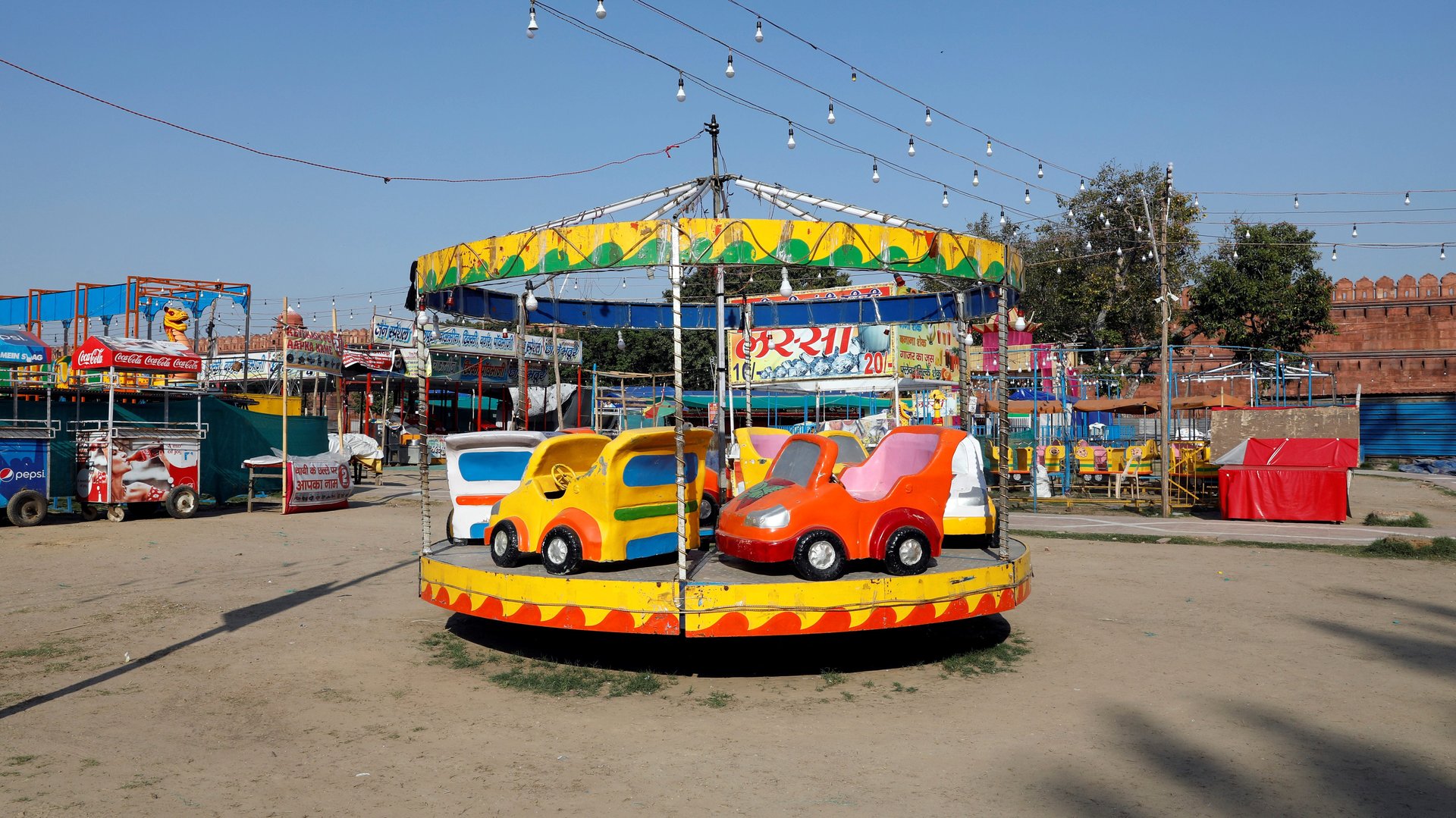How coronavirus caught life and businesses unawares in India
“How the world has changed in one month: Feb. 14 was Valentine; March 14 was quarantine,” reads a meme circulating on WhatsApp in India. Its popularity, perhaps, stems from the fact that in India, the coronavirus outbreak has spiralled too quickly.


“How the world has changed in one month: Feb. 14 was Valentine; March 14 was quarantine,” reads a meme circulating on WhatsApp in India. Its popularity, perhaps, stems from the fact that in India, the coronavirus outbreak has spiralled too quickly.
On Jan. 30, the country’s first confirmed case was reported in the southern state of Kerala. Less than 50 days later, businesses are feeling the impact of the pandemic.
Yesterday (March 17), thousands of employees of budget carrier GoAir were asked to take forced leave without pay. The airline cited an “unprecedented decline” in air travel within the country, besides the halting of all its international operations.
Between March 2 and March 17, the benchmark Sensex plunged nearly 18%, wiping out over Rs20 lakh crore ($200 billion) of investor wealth on BSE.
There has been a 40% decline in footfalls at restaurants in the last fortnight. Retail brands are suffering as malls in several cities have been temporarily shuttered, and overall consumer spending is anticipated to fall drastically in the coming weeks as people practice social distancing as a precautionary measure.
Soon, the country’s over $150-billion IT services industry—which gets more than half of its revenue from the US—may also land into trouble as the US embassy in India has stopped issuing immigrant and non-immigrant visas starting March 16.
Even as they grapple with falling toplines, businesses are unsure of how to protect their staff.
The new world order
Twenty-five-year-old Arpita Verma (name changed) and a few of her colleagues at a health insurer in Gurugram, near Delhi, have spent several hours in the last two weeks, trying to convince bosses to allow them to work from home.
Many of the staff, they say, commute from Delhi daily, where at least 10 people have tested positive for coronavirus and one person has died.
“We have hundreds of people sitting right next to each other in the office. So many people have a cough and flu even on a regular day. Now, if anyone sneezes even once, people start panicking,” said Verma who has been working with the firm for about six months now. “We’ve been told that we cannot work remotely, but we must wash our hands more frequently, use hand sanitisers, and wear masks inside the office if we want.”
Yesterday, the first confirmed case of coronavirus was reported in Gurugram when a 29-year-old woman who had recently traveled to Malaysia and Indonesia tested positive. On March 7, digital payments major Paytm shut its Gurugram office for 15 days after an employee tested positive.
To be fair, Verma’s employer faced a serious data theft in December that almost cost it a major client, according to her. After that, the company revoked the laptops of all senior employees and moved them to desktops, like the rest of the staff. The company also restricted smartphone usage on the office floor. “The management also has a point when they say they cannot arrange laptops for their over 700 employees overnight,” Verma said.
Verma’s is certainly not the only company faced with such a predicament.
Over 50% of Indian companies do not have the right technology and enough resources to allow their employees to work from home, according to a recent Gartner report. For instance, banks across India are working at full strength. “Our staff has to be in the bank centres to clear online transactions before they are finally settled by RBI. We don’t have an automatic process for it yet,” an executive of a large state-owned lender told CNBC-TV18.
In fact, until social distancing became the need of the hour, remote working was often looked down upon in India. Beyond just tech and infrastructure, several employers will possibly struggle to overcome that archaic mindset.
Meanwhile, those who have been given a chance to stay away from work, can’t seem to hold down.
Chaos, confusion, clamour
On its part, the Indian government has swiftly taken several measures to curtail the pandemic. Covid-19 has directly affected only around 130 people in the country so far, as per official records. This includes three who have succumbed to the disease and 13 who have recovered.
The country has sealed its borders, screened over 1.4 million people at various airports, set up helpline numbers to assist citizens, and issued advisories on preventive measures and social distancing.
Earlier this month, the authorities in the Pathanamthitta district of Kerala, used GPS tracking, CCTV footage, and call records to track down over 900 people who had come in contact with a family that had arrived from Italy on Feb. 29.
In the National Capital Region, too, the authorities took quick and comprehensive action when a 45-year-old man was tested positive for the coronavirus. His immediate family and relatives who he visited in Agra were quarantined, the school that his son attended was temporarily shut, and a five-star hotel where he had hosted a party was cleansed.

After shutting schools, malls, and putting restrictions on public gatherings, on March 17, the country also decided to close its most famous tourist spot, the Taj Mahal, as a measure to discourage people from crowding.
Yet, things are not fully under control.
At least 15 people have so far run away from quarantine facilities in different states, only to be hunted down and brought back, according to news reports. For instance, on March 14, two American citizens ran away from a Kerala hospital and were found at an airport while they were trying to fly to Doha. And on March 16, 11 suspects ran away from an isolation facility in Navi Mumbai.
There is also a sense of commotion among citizens.
Consumer goods are flying off the shelves in several parts of the country as customers have started hoarding essentials like flour, oil, salt, soap, and toothpaste. Several pharmacies have completely run out of preventive items like sanitisers and masks, and are struggling to get fresh stock.
“I didn’t have a single bottle of sanitiser in my store for the last three days and I have been getting more than 50 customers each day asking for it. My regular dealers don’t have any stock,” Arun Kumar, who runs a pharmacy in Gurugram told Quartz on March 17. “Today, a friend of mine connected me to a dealer who has some stock of a premium sanitiser brand that costs Rs600 a bottle. I got 10 bottles from him and have already sold six of those. I am making sure I don’t sell more than one bottle to any one customer.”

Several gated communities across Delhi, Gurugram, and Bengaluru have implemented self-quarantine by asking residents to collect their home-delivery packets from the main gate so that outsiders don’t have to come inside the premise. Among other steps, these communities have also closed swimming pools, gyms, and club houses, and installed taps outside the entry points for domestic workers to wash their hands before entry.
With heated discussions and confusion about what’s safe and what’s not, several people are planning to put off non-essential purchases until there’s more clarity on the situation. And that could cost India’s crippling economy dearly.
A rock and a hard place
Even before coronavirus surfaced in India, the country’s economy was not in great shape.
On Jan. 7, advance data released by India’s Central Statistics Office suggested that GDP growth in the country during the current financial year would fall to 5%, the slowest since the 2008 economic crisis. The country has been reeling under falling factory output, plunging rural wages, and an unemployment rate that’s the highest in 45 years.
Now, with the Covid-19 disruption , several global ratings agencies, including S&P and Moody’s, see India’s growth further deteriorating this calendar year.
Several industries in India have been struggling with their own peculiar challenges. For instance, the aviation sector has been dealing with high costs and wafer-thin margins for over a year. The coronavirus outbreak might be the last nail in the coffin for some airlines.
“In January and February 2020, IndiGo experienced (a) modest impact from the Coronavirus. We cancelled our flights to China and Hong Kong and reduced frequency to certain other Southeast Asia markets. This capacity was redeployed in other markets without having a material impact on our revenues,” low-cost carrier, IndiGo, said in a note to the BSE (pdf) on March 11. “Over the past few days, however, week-on-week, we have seen a 15-20% decline in our daily bookings…We expect our quarterly earnings to be materially impacted because of the above.”